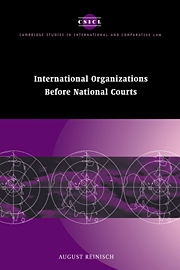Book contents
- Frontmatter
- Contents
- Preface
- Acknowledgements
- Table of cases
- Table of legal instruments
- List of abbreviations
- 1 Purpose, subject and methodology of this study
- PART I DESCRIPTIVE ANALYSIS
- PART II POLICY ISSUES
- 4 Rationales for judicial abstention
- 5 Reasons for asserting jurisdiction
- PART III FUTURE DEVELOPMENTS
- Bibliography
- Index
- Cambridge Studies in International and Comparative Law
4 - Rationales for judicial abstention
Published online by Cambridge University Press: 18 December 2009
- Frontmatter
- Contents
- Preface
- Acknowledgements
- Table of cases
- Table of legal instruments
- List of abbreviations
- 1 Purpose, subject and methodology of this study
- PART I DESCRIPTIVE ANALYSIS
- PART II POLICY ISSUES
- 4 Rationales for judicial abstention
- 5 Reasons for asserting jurisdiction
- PART III FUTURE DEVELOPMENTS
- Bibliography
- Index
- Cambridge Studies in International and Comparative Law
Summary
This chapter focuses on the rationales of the approaches of domestic courts when they are confronted with disputes to which international organizations are parties. It aims to clarify the underlying policy reasons for abstention on the one hand and involvement on the other hand which are sometimes very expressly advanced, and sometimes only implicit, in the court decisions analyzed. The major part of this discussion of judges and scholars arises from a context of immunity cases. Nevertheless, most rationales are valid beyond the narrow framework of immunity in a technical sense. Thus, they will be discussed here in a broader context, resulting from the use of various abstention and involvement techniques as outlined in Part I.
A number of reasons have been put forward to justify immunity for international organizations. Normally they are not expressly limited to immunity from suit, but form part and parcel of a wholesale grant of privileges and immunities to international organizations. It is also useful to analyze the case law and to inquire into the reasons why immunities and privileges should not be granted to international organizations. Balancing those competing rationales might ultimately form the basis for an appropriate solution to decide actual immunity issues as will be undertaken in Part III.
The protection of the functioning and independence of an international organization
The paramount rationale for granting immunities to international organizations in general and immunity from legal process in particular lies in securing their independence and guaranteeing their functioning.
- Type
- Chapter
- Information
- International Organizations before National Courts , pp. 233 - 251Publisher: Cambridge University PressPrint publication year: 2000

